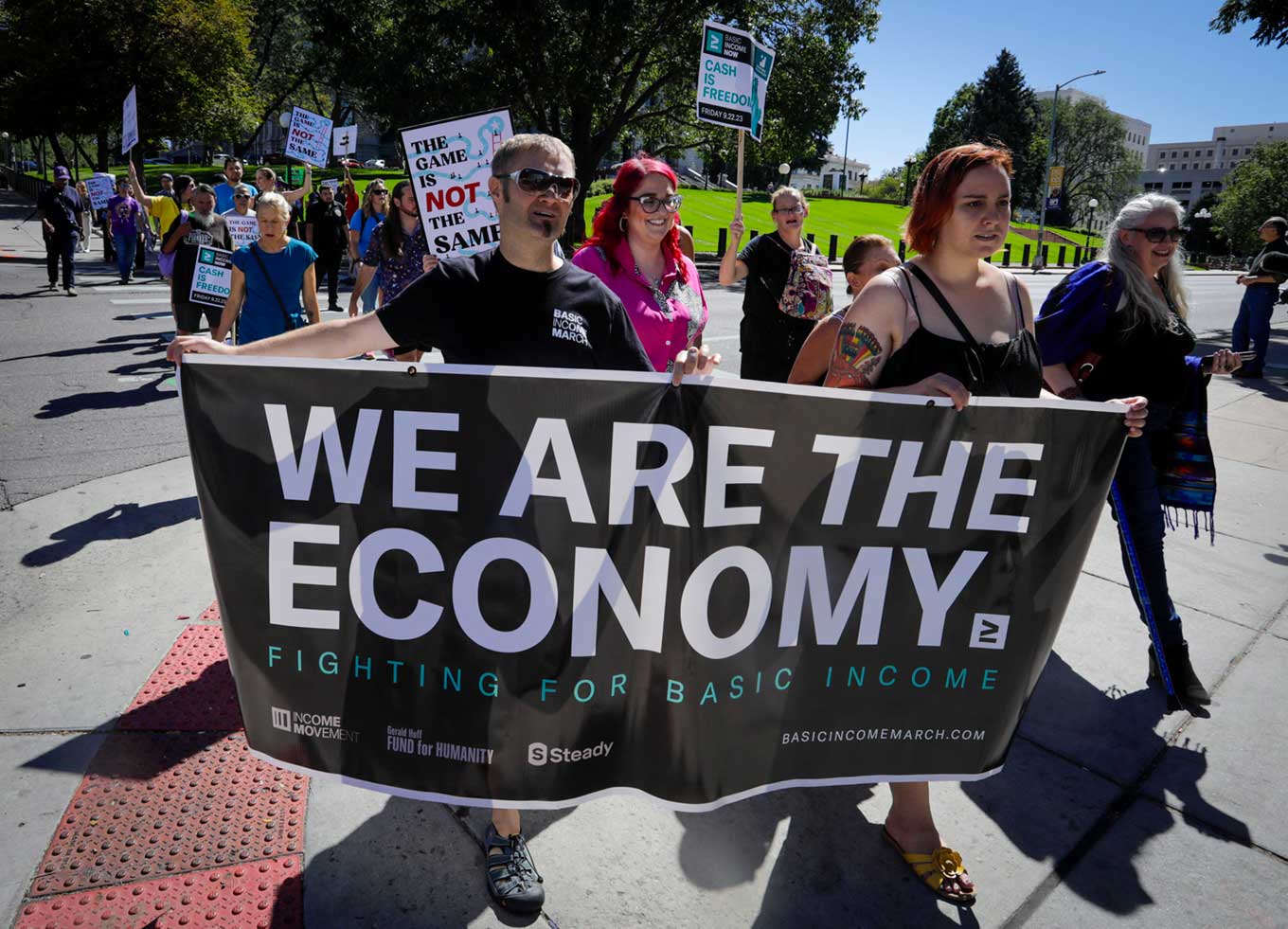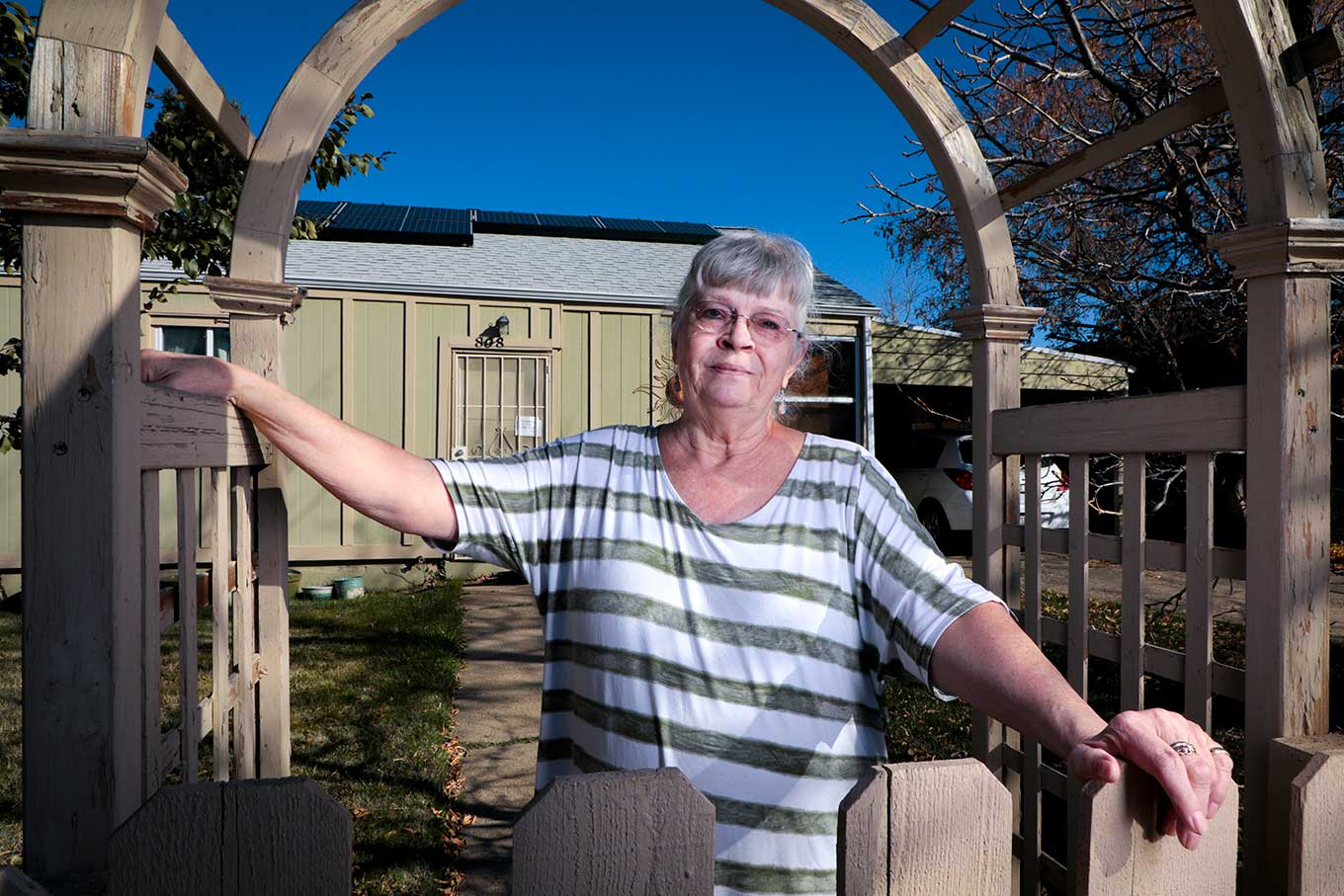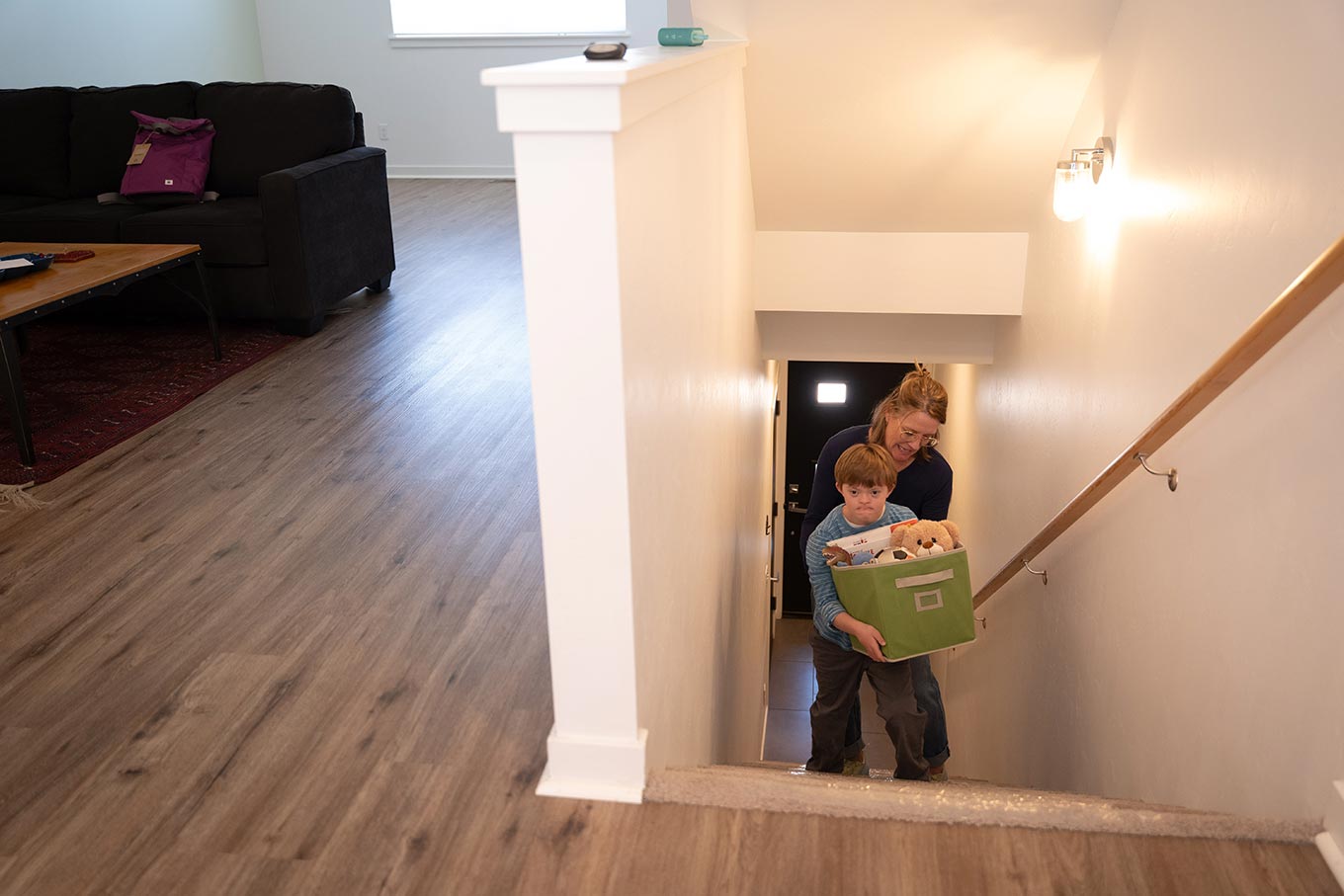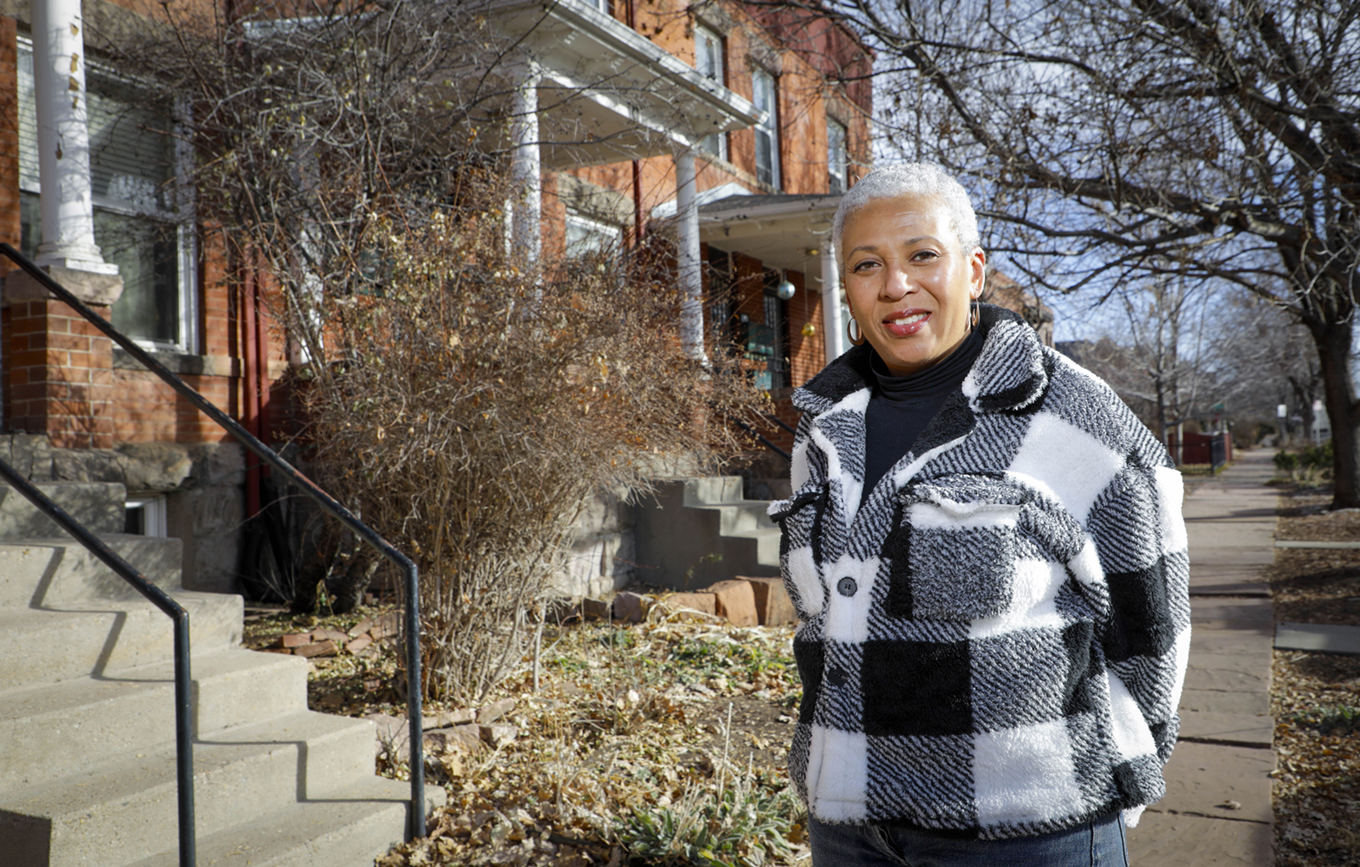One of the nation’s largest guaranteed monthly income experiments for unhoused people helped Lewis Horton, Hunter Ambrose and Moriah Rodriguez secure shelter. It enabled several others to attend school, and another person to create art in advance of their first show.
They are among 807 participants in the Denver Basic Income Project (DBIP), designed to discover what happens when people living on the streets receive cash every month with no strings attached. Organizers found the first year’s results encouraging: About 45% of enrollees obtained housing and many used the money to pay for food, car insurance and other necessities.
Now, project organizers are about to learn what happens when funding runs dry.
Despite repeated attempts to persuade Denver city officials to allocate additional money, DBIP sent what could end up being its final payment to participants on Sept. 15, halting the effort nine months into its second year of work. The project raised $14 million in the last three-and-a-half years including $4 million from the City of Denver. Mayor Mike Johnston’s staff said the project’s first-year results were not robust enough to justify further funding.
For Horton, who began receiving $1,000 per month in early 2023, the end of the payments couldn’t have come at a worse time.
“I got laid off from my job as a security guard on Sunday after being there for 10 months,” he said while walking through Denver’s Civic Center Park on Sept. 18. Horton was attending a rally in which about 70 people lobbied Johnston for continued support of DBIP. “My landlord agreed I could pay only half of the rent I owe for this month, at least.”
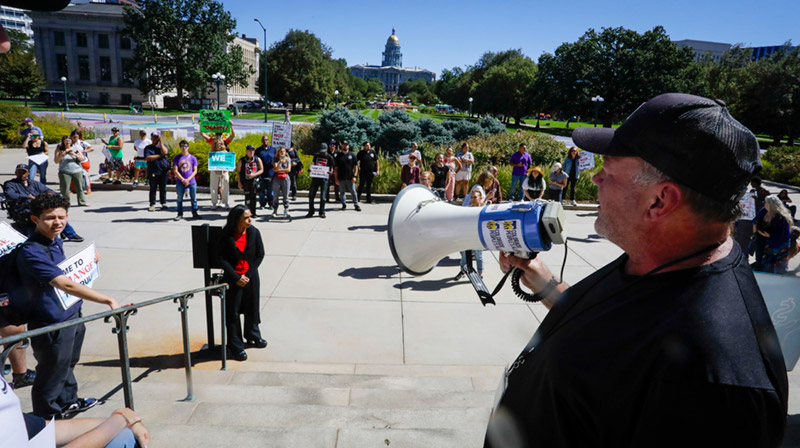
Lewis Horton, a Denver Basic Income Project participant, speaks to supporters at a rally on Sept. 18, 2024 at the Denver City and County building, advocating for a continuation of funding for the program. Photo by Joe Mahoney / Special to The Colorado Trust
The future is uncertain for Horton and his fellow DBIP participants, who range in age from 18 to 86 years old. The lapse in monetary support for the project raises questions about the sustainability of guaranteed income programs—particularly if such efforts cannot retain funding in a relatively progressive city like Denver. Direct cash pilots are meant to add to public assistance programs such as the Supplemental Nutrition Assistance Program and Temporary Assistance for Needy Families, not replace them.
It also underscores how difficult it is to conduct a cost-benefit analysis—research that shows how financially effective a program is—on unconditional cash pilots. The power of such efforts can also be a political Achilles heel for policymakers holding the purse strings, as direct cash initiatives carry no work requirements like other public assistance programs.
While these programs have normalized unconditional cash as a policy idea nationwide and dispelled the myth that they discourage people from working, the direct cash movement’s future remains uncertain, said Sean Kline, the former director of the Stanford Basic Income Lab who now advises the behavioral science organization ideas42.
“All guaranteed income pilots raise important questions regarding how much can they be transformative, and for how long,” Kline said. “It’s going to take time before we have a better sense of that.”
Kline singled out DBIP, saying that “out of all these pilots, it’s the most important one in influencing how we view economic security and homelessness.”
He noted that one of the experiment’s early lessons was how additional assistance that project staff gave participants provided a powerful hand up. They helped participants access the resources they needed, such as to find housing, start cell phone plans and open bank accounts. Other pilots should emulate that type of assistance, he said.
DBIP organizers need $1.7 million to finish out this year—a necessity, they argue, because early data found participants require more time to gain stability, and researchers also need more information to draw conclusions about how long-term assistance helps unhoused people. They also asked the city for an additional $15 million, one-third of which would pay for a third year for the current cohort, and the remaining two-thirds to go toward providing a new group of 300 unhoused individuals with a monthly basic income for three years.
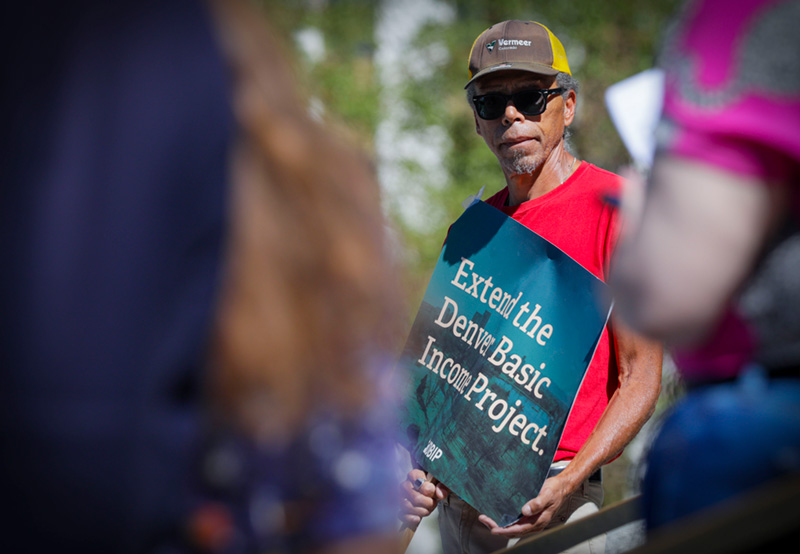
Mark Gaskin, a Denver Basic Income Project participant, listens at a rally for the Denver Basic Income Project on Sept. 18, 2024. Gaskin, along with others who spoke at the demonstration in Denver, stressed the benefits of sustaining the program. Photo by Joe Mahoney / Special to The Colorado Trust
Funding challenges for such experimental programs aren’t unique to Colorado. More than 100 groups are part of an unprecedented movement across the country to provide direct cash to about 8,500 participants, including low-income parents, students, immigrants and others.
Stanford University research found that direct cash recipients nationwide have used the funds for food, transportation, housing and health care. Little, if any, was spent on vices, firmly dispelling long-held stereotypes that people experiencing poverty are poor stewards of cash.
Direct cash efforts gained momentum during the COVID-19 pandemic after the federal government expanded the Child Tax Credit in 2021, which sent $3,600 per child to families, depending on their income. The bipartisan effort reached 60 million kids and became the largest direct cash outlay in U.S. history.
It showed the power of no-strings-attached assistance, reducing child poverty to its lowest level on record. It also highlighted what can happen when aid expires: The gains were reversed. Vice President Kamala Harris, the Democratic presidential nominee, has proposed expanding the program again if elected.
Yet the movement to provide direct cash (the phrase is used interchangeably with guaranteed or basic income)—which blossomed in 2016 after 100 entrepreneurs, researchers and activists endorsed the Economic Security Project—is under siege in Republican-controlled states. In the last two years, lawmakers in Arkansas, South Dakota, Idaho and Iowa voted to ban such programs, arguing they discourage people from working and waste taxpayer money.
On Sept. 19, Texas Attorney General Ken Paxton sued Harris County for allegedly attempting to restart a guaranteed income program known as “Uplift Harris.” The Supreme Court of Texas had ordered the project stopped pending the outcome of a separate lawsuit filed by Paxton in April. The claim said that the state constitution “forbids” municipalities from spending public money on such a program.
The lawsuit prompted founders and members of Mayors and Counties for a Guaranteed Income to send letters to Paxton with statistics that showed that direct cash pilots nationwide, including those in Cambridge, Mass. and Saint Paul, Minn., increased employment rates. The group, which represents almost 200 current and former elected officials, has supported projects that will deliver at least $250 million in no-strings-attached cash to participants nationwide.
In the Centennial State, such efforts have garnered plenty of philanthropic support. The Colorado Trust has provided $2.5 million to DBIP to date. The Women’s Foundation of Colorado funds 13 of 32 cash assistance programs statewide through its WINcome initiative (Women + Income = Women Thriving), providing $2.8 million to partners to distribute to about 1,600 women since 2021. The organization, citing results that such efforts increased participants’ financial stability, plans to continue allocating about $1 million for each of the next three years.
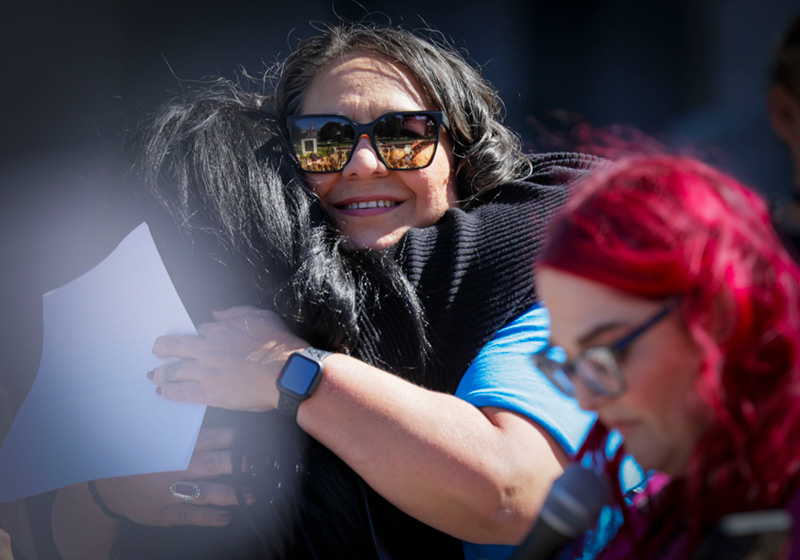
Hunter Ambrose, left, hugs Maria Sierra of the Denver Basic Income Project, after Ambrose spoke about her participation in the program to supporters at the Sept. 18 rally. Photo by Joe Mahoney / Special to The Colorado Trust
Research showed that enrollees used flexible cash assistance for food, transportation and housing costs. Like the Denver Basic Income Project, WINcome is “trying to move in the direction of longer-term partnerships,” said Louise Myrland, vice president of programs at The Women’s Foundation of Colorado. This work mirrors a nationwide effort by the Guaranteed Income Community of Practice, which seeks to pivot from pilot projects to public policy that guarantees an ongoing funding source for such efforts.
Colorado’s 32 programs served almost 30,000 people through October 2023 with some form of cash distribution, according to a report by The Women’s Foundation of Colorado and its evaluation partner Point b(e) Strategies. The study found that challenges to expanding such efforts included fundraising.
DBIP’s funding shortfall comes after it released findings from the effort’s first year in June. University of Denver researchers found the effort’s 807 enrollees used the no-strings-attached payments to gain economic security.
Participants were randomly split into three groups, with group A receiving cash payments of $1,000 a month, group B initial $6,500 payments and then 11 monthly payments of $500, and group C $50 a month. Those who reported living in stable housing doubled in all three groups from enrollment to the 10-month mark, to about 48% of all participants, researchers found.
Those in groups A and B reported an increase in full-time work and that the cash payments doubled their ability to pay all bills. The analysis also found “significant reductions in public service utilization,” including ambulance trips, drug and alcohol treatment center nights, jail time and emergency room and shelter visits across all cohorts for a savings of $589,214.
“We have seen lives transformed because of this. People are clean and sober,” said Mark Donovan, an entrepreneur who conceived the DBIP pilot in 2020.
His team already knows what happens when there’s a gap in payments: The project ran out of money between its first and second years, causing it to lose touch with about 126 of the original participants.
Donovan stood among rallygoers on Sept. 18 in the broiling sun on the steps of the city and county building in Civic Center Park and called on Mayor Johnston to further fund the project. A contingent of participants went into the building and ran into the mayor in the hall, who suggested they make an appointment to see him.

Sierra Trujillo, an attendee of a Sept. 18, 2024 rally in support of the Denver Basic Income Project, holds a sign calling for the City of Denver to fund the program. Photo by Joe Mahoney / Special to The Colorado Trust
Meanwhile, Johnston’s spokesperson said his staff doesn’t believe the experiment’s first year’s results are robust enough for the Department of Housing Stability to recommend ongoing funding in 2025.
“Unfortunately, the data in the year-one report from the DBIP did not show a statistically significant difference in homelessness resolution between the groups that received large cash transfers and those who did not,” said Jordan Fuja, the mayor’s press secretary, in a written statement. “We are committed to using [the Department of Housing Stability’s] limited dollars for programs that efficiently help as many people as possible get and stay housed.”
In an interview, Donovan pushed back on the assertion that DBIP does not provide a sufficient return on investment.
“Both our quantitative and our qualitative data shows that we are creating accelerated pathways to housing for all groups at a price that we think is competitive, or beats, costs for other housing programs,” he said. “We want to find ways to sustain the gains we’ve made and to bring them to more people by building on our initial successes.”
For program participants, the end of their monthly checks means they will again need to make tough choices such as whether to pay car insurance, purchase food or obtain health care.
“I used the $1,000 a month I received to pay my car note and to carry insurance on it,” said Mark Gaskin, who lost his job and his housing after he was injured at work and who now lives in his car. “For me, the loss of income means it’s going to be a lot harder to take care of my aunt, because of her age and her medical condition. She needs someone to help.”
